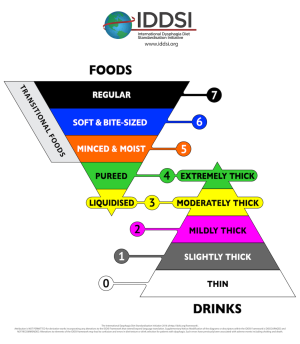Struggling to swallow could be a sign of this hidden condition - Learn about dysphagia today!
By
- Replies 19
As we age, our bodies undergo a myriad of changes, some more noticeable than others. While we're all familiar with the common signs of aging like graying hair and wrinkles, there are other, less obvious conditions that can significantly impact our quality of life. One such condition is dysphagia, a term that might not be as well-known as arthritis or cataracts, but it affects a surprising number of older Australians.
Dysphagia is the medical term for swallowing difficulties. It's a condition that can make the simple act of eating or drinking a challenging and sometimes dangerous task. According to Speech Pathology Australia, around one million Australians are currently living with dysphagia, and it's particularly prevalent among those in aged care, affecting around 50% of residents.
But what exactly is dysphagia, and why is it so common in older adults? Let's delve into the mechanics of swallowing to understand this better. On average, humans swallow up to 900 times a day, engaging 26 different muscles, several nerves, and a series of internal pumps and valves that transport food and drink from the mouth to the stomach. A key player in this process is the epiglottis, a movable flap near the base of the throat that ensures what we consume doesn't go down the wrong pipe, so to speak.
When this intricate system is compromised, the risks can be significant. Natalie O'Brien, a speech pathologist who recently appeared on Maggie Beer’s Big Mission for ABC TV, explains that dysphagia is often a symptom of a neurological diagnosis such as dementia, motor neurone disease, Parkinson’s disease, and multiple sclerosis. It can also occur as part of the natural aging process or as a result of anatomical changes, such as those caused by head and neck cancer surgeries.
The warning signs of dysphagia include regular coughing during meals, a choking sensation while eating or drinking, a 'wet' or gurgly voice, pain or considerable effort when swallowing, food or drink regurgitating through the nose, difficulty swallowing medication, and the feeling that something is stuck in the throat. If you or someone you care for is experiencing these symptoms, it's crucial to see a GP for a referral to a specialist or a speech pathologist.
The risks associated with dysphagia are not to be taken lightly. Aspiration, where food or liquid ends up in the lungs, can lead to aspiration pneumonia, a potentially life-threatening condition. Choking is another serious risk that can lead to death or long-term complications. Furthermore, dysphagia can result in dehydration and malnutrition, as individuals may eat and drink less to avoid discomfort.
So, how can dysphagia be managed? There are several strategies that can help, including swallow rehabilitation exercises guided by a speech pathologist, safe swallowing techniques such as sitting upright and taking one sip at a time, and modifying the texture of food and drinks. Caregivers should also be cautious with certain foods like bread, which can be difficult to swallow, and medications, which may be easier to take with a puree rather than water.
While there is no medication that directly treats dysphagia, managing the underlying condition, such as Parkinson's disease, can sometimes improve swallowing ability. And with proper management, individuals with dysphagia can indeed lead long and fulfilling lives. Regular assessments by a speech pathologist are essential to ensure that the management strategies in place continue to meet the person's needs.
It's important to remember that this is general information, and for personalized advice, you should consult a qualified medical practitioner familiar with your medical history. If you're interested in learning more about dysphagia and how it affects older Australians, you can stream Maggie Beer's Big Mission anytime on ABC iview.
 At the Seniors Discount Club, we understand that conditions like dysphagia can be concerning, but knowledge is power. By learning about dysphagia today, you can be better prepared to recognize the signs and seek the appropriate care. Have you or a loved one experienced difficulties with swallowing? Share your experiences and any tips you might have for managing this condition in the comments below. Your insights could be invaluable to someone facing similar challenges.
At the Seniors Discount Club, we understand that conditions like dysphagia can be concerning, but knowledge is power. By learning about dysphagia today, you can be better prepared to recognize the signs and seek the appropriate care. Have you or a loved one experienced difficulties with swallowing? Share your experiences and any tips you might have for managing this condition in the comments below. Your insights could be invaluable to someone facing similar challenges.
Dysphagia is the medical term for swallowing difficulties. It's a condition that can make the simple act of eating or drinking a challenging and sometimes dangerous task. According to Speech Pathology Australia, around one million Australians are currently living with dysphagia, and it's particularly prevalent among those in aged care, affecting around 50% of residents.
But what exactly is dysphagia, and why is it so common in older adults? Let's delve into the mechanics of swallowing to understand this better. On average, humans swallow up to 900 times a day, engaging 26 different muscles, several nerves, and a series of internal pumps and valves that transport food and drink from the mouth to the stomach. A key player in this process is the epiglottis, a movable flap near the base of the throat that ensures what we consume doesn't go down the wrong pipe, so to speak.
When this intricate system is compromised, the risks can be significant. Natalie O'Brien, a speech pathologist who recently appeared on Maggie Beer’s Big Mission for ABC TV, explains that dysphagia is often a symptom of a neurological diagnosis such as dementia, motor neurone disease, Parkinson’s disease, and multiple sclerosis. It can also occur as part of the natural aging process or as a result of anatomical changes, such as those caused by head and neck cancer surgeries.
The warning signs of dysphagia include regular coughing during meals, a choking sensation while eating or drinking, a 'wet' or gurgly voice, pain or considerable effort when swallowing, food or drink regurgitating through the nose, difficulty swallowing medication, and the feeling that something is stuck in the throat. If you or someone you care for is experiencing these symptoms, it's crucial to see a GP for a referral to a specialist or a speech pathologist.
The risks associated with dysphagia are not to be taken lightly. Aspiration, where food or liquid ends up in the lungs, can lead to aspiration pneumonia, a potentially life-threatening condition. Choking is another serious risk that can lead to death or long-term complications. Furthermore, dysphagia can result in dehydration and malnutrition, as individuals may eat and drink less to avoid discomfort.
So, how can dysphagia be managed? There are several strategies that can help, including swallow rehabilitation exercises guided by a speech pathologist, safe swallowing techniques such as sitting upright and taking one sip at a time, and modifying the texture of food and drinks. Caregivers should also be cautious with certain foods like bread, which can be difficult to swallow, and medications, which may be easier to take with a puree rather than water.
While there is no medication that directly treats dysphagia, managing the underlying condition, such as Parkinson's disease, can sometimes improve swallowing ability. And with proper management, individuals with dysphagia can indeed lead long and fulfilling lives. Regular assessments by a speech pathologist are essential to ensure that the management strategies in place continue to meet the person's needs.
It's important to remember that this is general information, and for personalized advice, you should consult a qualified medical practitioner familiar with your medical history. If you're interested in learning more about dysphagia and how it affects older Australians, you can stream Maggie Beer's Big Mission anytime on ABC iview.
Key Takeaways
- Dysphagia is a condition characterised by difficulty swallowing, affecting up to one million Australians, including 50% of those in aged care.
- Symptoms of dysphagia include regular coughing during mealtimes, choking, a 'wet' voice, pain while swallowing, and feeling like something is stuck in the throat.
- The risks related to dysphagia can be significant and include aspiration pneumonia and choking, which can both be life-threatening.
- Management and treatment options for dysphagia include swallow rehabilitation, safe swallowing strategies, food and drink modification, and careful medication management, with the potential for individuals to live a long life if the condition is well managed.










